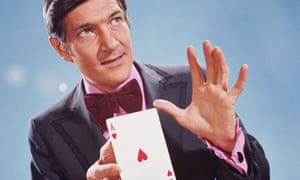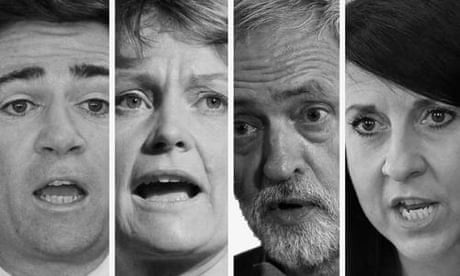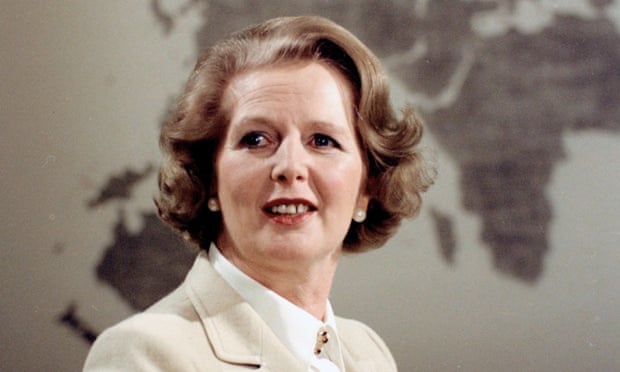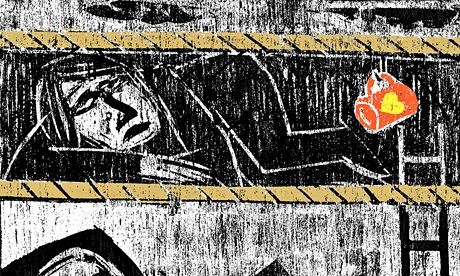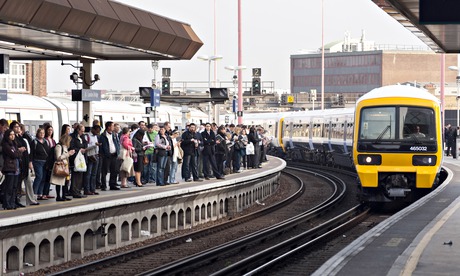
London Bridge train station. Photograph: Alex Segre/FlickrVision
Train fares are going up. We learned that last week, although "learn" is putting it strongly. We knew they would. It's not as if they would go down: train fares go up, like electricity bills, gas bills, water bills, rent and chief executives' salaries. To the loyalists of the Thatcher-Blair-Cameron succession, higher train fares are a positive, because they mean lower subsidies: another incremental step in a 35-year programme to shift the burden of paying for infrastructure from the well-off to the strugglers. To most of us, it's another sign of the folly of selling off the railways. But amid the dismal annual round of fare rises, it's easy to miss another, stranger, more gradual sign of the failure of the vast social and economic experiment conducted on the British people since 1979: privatisation.
A trio of awkward synthetic words has begun to appear among the owners of private train companies that looks as if a computer has been asked to name the new musketeers: Abellio; Govia; Keolis. What these bland corporate signifiers mask is state-owned but commercialised European rail firms. Collectively, European state railways now own more than a quarter of Britain's passenger train system.
I imagine they will do a decent job. And that's the trouble. If competition shows that the best companies to run Britain's privatised railways are state-owned railways from other countries, what does that say about the justification of privatisation? And what does it say about what privatisation has done to Britain? How did we get to the point where this country's railways, power stations and postal service were ready to be taken over by foreign versions of British organisations that our own government, claiming patriotism, systematically took to pieces?
One winter's morning in 1991 I loaded a guitar, a condensed edition of the Oxford English Dictionary and a Teach Yourself Russian course into an old Volkswagen, left the house near Edinburgh where I had been staying and drove to Kiev. Five days passed on the road. I left the familiarity, order and prosperity of Britain, the island where I had grown up, and travelled east to wait for the Soviet Union to dissolve. I didn't have to wait long. A few weeks after I arrived, it ceased to be. Russia and Ukraine went their separate ways. The Kiev traffic policeman waving down my foreign-plated car had time to utter the words, "What are you doing in the Soviet Union?" before the colour left his face, his mouth went dry, and he turned away, lost, a bully orphaned of his corporate father.
A 70-year experiment to test whether the ethos of the commune could be imposed on a transcontinental empire of hundreds of millions of people was over, long after the answer was in (it couldn't). I wasn't sorry to see Soviet communism go. Despite all that's happened since, I still don't mourn it. There was hope in the beginning that something fine would grow in the gap that was left. It was a while before I realised the cynical, grasping figures who moved in to take possession of the ruins were not, as I had hoped, transitional symptoms of change, but the essence of that change.
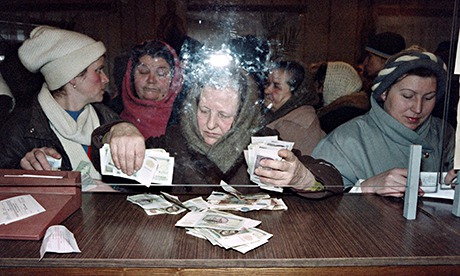 Ukrainian women exchange Soviet rubles against Ukrainian karbovanets, on January 17, 1992 in Kiev. Photograph: SERGEI SUPINSKY/AFP
Ukrainian women exchange Soviet rubles against Ukrainian karbovanets, on January 17, 1992 in Kiev. Photograph: SERGEI SUPINSKY/AFP
Watching the vultures come to feast on the carcass of the world's largest state-owned, planned economy, I began to find the terms to question what had been done by politicians, economic theorists, lobbyists and business people in my own country. I had thought, when I left Scotland, in the unconscious way certainties are stowed in one's mind, that I knew Britain; that some essential way of being would be resilient to Margaret Thatcher's rearrangements, which must, as transient policies, be superficial. I had to go home by way of Kiev and Moscow to see that I was wrong, to begin to see how, and how deeply, she and her followers altered Britain.
With hindsight, 1991 was a pivotal year. When it began, the free market economic belief system, with its lead proselytisers Thatcher and Ronald Reagan, had been pushing back for more than a decade against various attempts to impose levelling communitarianism around the world. The Berlin Wall had fallen, as had communist regimes in Poland, Czechoslovakia, Hungary, Romania and Bulgaria. The market belief system, which holds that government is incompetent by default, that state taxation is oppressive, that the desire for wealth is the right and principal motivator of achievement and that virtually all human wants can best be met by competing private firms, was becoming entrenched in the non-communist world, from Chile to New Zealand. Made bold by a popular public perception that government overspending and selfish organised labour were to blame for economic stagnation and high inflation in the 1970s, Thatcher and Reagan had taken on powerful trade unions, and won. Barriers to the international movement of goods and money had fallen; the European Union was, on paper, a single marketplace. In Britain, restrictions on how much ordinary people could borrow to finance their everyday needs had been scrapped, and millions had acquired credit cards. Volumes of regulations controlling how banks were allowed to use people's deposits had been torn up, and unimaginably vast sums were being moved privately from country to country. Government spending had been cut, as had income tax and corporation tax. Sales tax and fees for everyday services had been raised. Council houses and big state enterprises had been privatised, with more on the way, leading to hundreds of thousands of redundancies. Thatcher's programme in Britain was an inspiration for the IMF and theWorld Bank as they experimented with the conditions they attached to bail-out loans to developing countries.
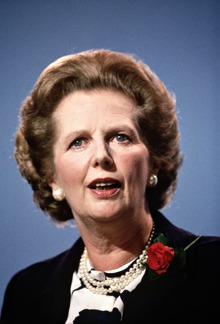 Margaret Thatcher in Bournemouth, Dorset in 1986. Photograph: David Levenson/Getty Images
Margaret Thatcher in Bournemouth, Dorset in 1986. Photograph: David Levenson/Getty Images
But at the end of 1990, the triumph of marketism seemed to hang in the balance. Reagan and Thatcher had relinquished the stage to less fervent, less charismatic successors. The man who'd introduced the market economy to China, Deng Xiaoping, had been blamed by traditional communists for fostering the Tiananmen Square protests, and was in disgrace. In the Soviet Union Mikhail Gorbachev, the great hope of free marketeers, was facing a similar backlash from hardliners, and the Baltic countries' hopes of escape from the USSR looked bleak. Saddam Hussein, dictator of semi-socialist Iraq, had invaded semi-capitalist Kuwait.
Yet the following year conviction began to grow among the marketeers that the final defeat of centrally planned, communitarian government was at hand, the sense that seemed to confirm such ideas as America having "won" the Cold War, and the "end of history". Early in 1991 it became clear that the Soviet leadership had lost the necessary unanimity and ruthlessness to keep Lithuania within the USSR. The humiliating collapse of the coup against Gorbachev that summer presaged recognition of Baltic independence, Ukraine's vote to go the same way, and the end of the Soviet Union. In Kuwait at the beginning of the year I saw experienced British war correspondents squabble for reporting billets among the frontline troops with the ferocity of those who believe something is being offered for the last time; we thought British and American armies might never fight another war. Few doubted Saddam would be beaten, and he was. That November, as I drove off the ferry at Ostend, heading east, it seemed a racing, expanding tide of victorious free marketism glimmered at my wheels, a tide that has gone by many names – consumer capitalism, Reaganism, Thatcherism, neoliberalism, the Washington Consensus. Though the watchtowers still stood at the old border between two Germanys, the border was gone. In eastern Germany, the narrow cobbled streets of medieval towns had jammed solid with second-hand cars. I passed a field where an impatient western German DIY chain, unwilling to wait for steel and breeze blocks, had erected a vast, circular retail marquee, blazing with lights. The canvas superstore seemed to have landed, like a spacecraft from a flashier civilisation, come down to offer shrink-wrapped packs of rawl plugs and a choice of bathroom fittings. In Poland, I got lost in fog near Wrocław, and saw how small shops had sprung up everywhere, even in the tiniest villages. In the middle of the night, in the middle of nowhere, in damp, coal-scented murk so thick I wasn't sure which way my car was pointing, I came across an entrepreneur hawking coffee from a roadside kiosk; the best coffee I ever tasted. He was like a champion of Thatcherite values, the small businessman standing ready to serve at all hours, in all weathers, making up for lost time under communism, silently mocking the market-questioning scepticisms I had brought with me from Scotland.
The effect on me of witnessing the unplanned collapse of a planned economy, where there'd been virtually no private property or private enterprise, was a series of viscerally direct lessons in economics. I saw how badly the Soviet communist system had failed on economic grounds alone, quite apart from its denial of personal freedoms. Long before the end, there was a hopeless housing shortage. Multiple households were sharing two-roomed flats; families were living in dormitories. Apartments seized from their bourgeois owners after the 1917 revolution were still unrepaired more than 70 years later. The infrastructure was rotten; there were cities and suburbs built around factories in the 1960s and 1970s where homes only had mains water for a few hours a day. Surpluses of goods nobody wanted (copies of the complete works of Soviet politicians, busts of Lenin) prevailed beside shortages of goods everybody wanted (cheese, coffee, sausage) because the element sticking together demand for a thing and the amount of trouble it took to produce and deliver it – the price – had been scraped out of transactions and replaced with a made-up figure concocted by planners in Moscow. Inequality was rampant, reflected not just in monetary wealth or property but in the degree to which you actually had access to the cheap goods everyone was supposed to have access to. One consequence of food and drink being allocated by civil servants according to central decrees, rather than by price, was that the restaurant business became an incubator for the black market and organised crime. Airports and railway stations looked like refugee camps because tickets cost virtually nothing, yet there weren't enough flights or trains to move the people who wanted to take them. The first response of the Russian and Ukrainian authorities after independence was to massively increase the production of a single essential item that people were chronically short of: money. Hyperinflation resulted, and millions of people had their savings wiped out.
The other side of the collapse of communism, along with the post-Soviet boons of freedom of movement, freedom of expression and freedom of initiative, was the flourishing of enterprise. Armies of tough middle-aged women made epic journeys to the bazaars of Poland, Turkey and China and returned to Ukraine and Russia with clothes to dress a handsome people as they'd yearned to dress, in jeans, leather and gold. Shops, restaurants, bars, cafés and night clubs opened up; book and music stalls were everywhere. Foreign firms brought wonders: a tampon factory, international direct dialling. Kiev went from a place where you couldn't buy anything to a place where you could buy anything, if you had the means.
Contempt for the planned economy, a new appreciation of the danger of printing excess money, gratitude to the entrepreneurs – there were times, in those early months in Kiev, that I asked myself whether I was becoming a Thatcherite. I can't pinpoint the moment when it soured for me. It might have been the sight of a solid rank of impoverished pensioners, some several hundred respectable old ladies, standing shoulder to shoulder in the freezing winter darkness outside Belarus station in Moscow, each holding a single sausage for sale – the free market as desperation. Or a visit to the Arctic mining city of Vorkuta, where miners were being paid in sandwiches while their bosses pocketed the money from the coal for which they were earning free-market prices.
 A surgeon performs a neck and throat operation in the recently opened Birmingham Queen Elizabeth Hospital Photograph: Christopher Furlong/Getty Images
A surgeon performs a neck and throat operation in the recently opened Birmingham Queen Elizabeth Hospital Photograph: Christopher Furlong/Getty Images
In the first stages of disillusionment, it didn't seem obvious to me to make connections between the extremes of marketisation and privatisation in the former Soviet Union and the partial privatisation of a British economy that had always been mainly private anyway. After all, where Britain had a series of regulators to set rules for the privatised industries – Ofcom, Ofwat and so on – the principal regulator of privatisation in Ukraine and Russia, at least in the early days, was murder. In Russia in particular, a small number of individuals quickly became fantastically rich when they took private control of state producers of petrochemicals and metals. They were grotesquely rewarded, or grotesquely undertaxed, and money that should have gone to rebuild roads or hospitals or schools went instead towards yachts, property in London and foreign football teams. But that had nothing in common with privatisation in Britain – did it?I began to notice something odd about the British and American business people and financial advisers I met in Ukraine and Russia in the 1990s. It was no surprise, I suppose, that they cared more about businesses being overtaxed than undertaxed, more about protection of private property than about protection of pensioners; that they didn't care how weak and bullied the local trades unions were. Besides, their Russian interlocutors kept being assassinated. What was revealing was how many of these emissaries of the capitalist way seemed to believe the myth that all that was good in the British and American economies had been constructed by the free market. They seemed to believe, or talked, made speeches, wrote papers as if they believed, that the entire structure of their own wealthy modern societies – the roads, the electricity grids, the railways, the water and sewage systems, the universal postal services, the telecoms networks, housing, education and health care – had been brought into being by individual entrepreneurs driven by desire for gain, with the occasional lump of charity thrown in, and that a bloated, parasitical state had come shambling onto the scene, seizing assets and demanding free stuff for its shirker buddies. I don't want to absolve the Russians or Ukrainians of responsibility for their handling of the aftermath of communism, but the template they were handed by the fraternity of the Washington Consensus was based on fake history. If this is what the triumphalists of Wall Street and the City of London told the Russians about the way of the capitalist world, I thought when I moved back to Britain in 1999, what have they been telling us? And what came of it?
When Thatcher's Conservatives came to power in Britain in 1979, much of the economy, and almost all its infrastructure, was in state hands. Exactly what gloss you put on "in state hands" depends on your political point of view. For traditional socialists, it meant "the people's hands". For traditional Tories, it meant "in British hands". For Thatcher and her allies, it meant "in the hands of meddling bureaucrats and selfish, greedy trade unionists". How much of the economy? A third of all homes were rented from the state. The health service, most schools, the armed forces, prisons, roads, bridges and streets, water, sewers, the National Grid, power stations, the phone and postal system, gas supply, coal mines, the railways, refuse collection, the airports, many of the ports, local and long-distance buses, freight lorries, nuclear-fuel reprocessing, air traffic control, much of the car-, ship- and aircraft-building industries, most of the steel factories, British Airways, oil companies, Cable & Wireless, the aircraft engine makers Rolls-Royce, the arms makers Royal Ordnance, the ferry company Sealink, the Trustee Savings Bank, Girobank, technology companies Ferranti and Inmos, medical technology firm Amersham International and many others.
In the past 35 years, this commonly owned economy, this people's portion of the island, has to a greater or lesser degree become private. Millions of council houses have been sold to their owners or to housing associations. Most roads and streets are still under public control, but privatisation has reached deep into the NHS, state schools, the prison service and the military. The remainder was privatised by Thatcher and her successors. By the time she left office, she boasted, 60% of the old state industries had private owners – and that was before the railways and electricity system went under the hammer.
The original background to Thatcher's privatisation revolution was stagflation, a sense of national failure, and a widespread feeling, spreading even to some regular Labour voters, that the unions had become too powerful, and were holding the country back. Labour, and Thatcher's centrist predecessors among the Conservatives, had tried to control inflation administratively, through various deals with unions and employers to hold down wages and prices; Labour had, under pressure from the IMF, cut spending. But Thatcher and her inner circle planned to go further, horrifying moderates in their party with the radicalism of their intentions.
The late Alan Walters, her chief economic adviser, believed a key source of inflation and the weak economy was the amount of taxpayers' money being poured into overmanned, old-fashioned, government-owned industry. Just as in the Soviet Union, he thought, Britain's state industries concealed their subsidy-sucking inefficiency through opaque, idiosyncratic accounting techniques that took little account of how much time and effort were required to do and make things, or what people actually wanted to buy, or how much they were prepared to pay for it. As long as the subsidies kept coming, neither managers nor workers had much incentive to come up with smarter working methods or accept new technology, because that would mean fewer jobs, which would mean less power for the bosses and a smaller union. Yes, Walters knew, his protégée would slash spending on steel and coal and power and all the rest, yes, hundreds of thousands of workers would be sacked, but that wasn't enough. As many state-owned companies as possible must be privatised – be divided up into shares and sold to the public. They'd no longer be subsidised; they'd have to borrow money like any private company, account meticulously to shareholders for every penny they spent or earned, and strive to make a profit. The bigger the profit, the more efficiently the firm would be doing its job, and the more management would be rewarded. Most importantly, they'd have to compete with other firms. If they fell behind their competitors, they'd risk bankruptcy. Managers would face incentives for success and penalties for failure. British industry would become more competitive internationally. It would serve citizens better. Government would save the taxpayer money. The sacked workers would get redundancy payments; they'd go off and start businesses, or find other, more useful jobs once the economy was working properly. Everyone would win, except the lazy, and Arthur Scargill.
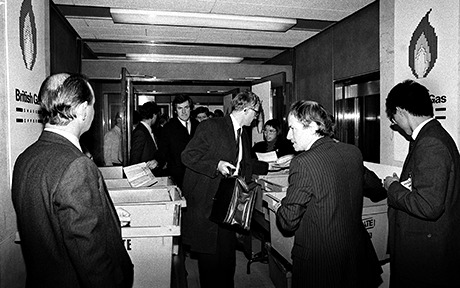 Last-minute subscribers deliver their applications for British Gas shares at one of the receiving banks, National Westminster, in the City of London. Photograph: PA/PA Archive/Press Association Images
Last-minute subscribers deliver their applications for British Gas shares at one of the receiving banks, National Westminster, in the City of London. Photograph: PA/PA Archive/Press Association Images
Millions did buy shares. Most Britons, bemused by the process, assumed the main reason for privatisation was to raise cash for a desperate government. Harold Macmillan, who before his death provided a snarky Wodehousian commentary from the wings on the work of the grocer's daughter, observed in an often paraphrased line: "The sale of assets is common with individuals and states when they run into financial difficulties. First, all the Georgian silver goes, and then all that nice furniture that used to be in the saloon. Then the Canalettos go."
Another leal privatiser, Nigel Lawson, a minister in the Thatcher government from the beginning almost to the end, dismissed the idea that the government cared about the price it was getting for selling off the family silver. Having many ordinary people owning shares, he writes in his memoirs, was the point. "The prime motives for privatisation were not Exchequer gain," he declares, "but an ideological belief in free markets and a wider distribution of private ownership of property."
Neither Walters nor Lawson, nor other allies like Keith Joseph, the ex-communist Alfred Sherman or Nicholas Ridley, would have been able to implement their ideas without Thatcher herself, her extraordinary sense of the way the political wind was blowing, her conviction of her own rectitude, and the stamina and persistence with which she was able to go on insisting on something until her opponents in government gave in. Hers was a different emphasis to Walters, who saw the curbing of "bloody-minded trades unions" as a useful side effect of privatisation. For Thatcher, privatisation, in the beginning at least, was simply one of many weapons to use in her battle against the unions, which was, in turn, a single episode in her war to exterminate socialism, to be fought in one unbroken front from Orgreave Colliery to Andrei Sakharov's place of exile in Gorky. Her great political inspiration, apart from her father, was the Austrian economist Friedrich Hayek's 1944 book, The Road to Serfdom, written in Cambridge during the war. Hayek was regarded as an able economist; he eventually won a Nobel prize for it. But The Road to Serfdom isn't an economics book. It's a book about society, the recent past and human nature that bears the same relation to sociology, history and psychology as Ayn Rand's Atlas Shrugged bears to literature. It is devoted to the idea that Winston Churchill later nodded to, catastrophically for him, in the 1945 election campaign, when he said Labour would have to fall back on "some form of Gestapo" to implement its welfare and nationalisation programme. Churchill was thrown out of office, and Labour won a huge majority.
The Road to Serfdom claims that socialism inevitably leads to communism, and that communism and Nazi-style fascism are one and the same. The tie that links Stalin's USSR and Hitler's Germany, in Hayek's view, is the centrally planned economy – as he portrays it, the attempt by a single central bureaucracy to direct all human life, to determine all human needs in advance and organise provision, limiting each to their rationed dole and their allotted task. Such a bureaucracy will no more tolerate dissent and deviation than the engineers tending a vast production line will accept a pebble jamming the gears. Confusingly, Hayek denies he is a pure libertarian, and declares the free market must have rules; he also says it is acceptable for government to "provide an extensive system of social services". Yet this is in contradiction to his main message, which is that there can be no mixture of state planning and free market competition. To him they are mutually exclusive. "By the time Hitler came to power, liberalism was dead in Germany," he writes. "And it was socialism that had killed it." Even to try to make socialism work, according to Hayek, is dangerous: "in the democracies the majority of people still believe that socialism and freedom can be combined. They do not realise that democratic socialism, the great utopia of the last few generations, is not only unachievable, but that to strive for it produces something utterly different – the very destruction of freedom itself."
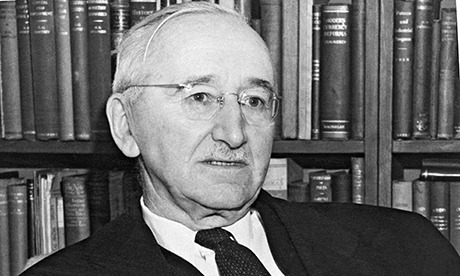 Author of "The Road to Serfdom" Friedrich Hayek, at the University of Chicago in 1960. Photograph: Bettmann/Corbis
Author of "The Road to Serfdom" Friedrich Hayek, at the University of Chicago in 1960. Photograph: Bettmann/Corbis
Hayek was proven wrong. As in other western European countries, socialists came and went from power in Britain, introduced a welfare state and took control of large swathes of the economy without democracy and individual freedoms being threatened. The NHS was set up, council houses were built, social security was established, state education was expanded, coal, rail and steel nationalised, yet despite all the planning this required, millions of private businesses, small, medium and large, carried on merrily competing (or co-operating) with each other, flourishing or going to the wall as the market determined. Private doctors kept their clinics on Harley Street, young aristos still ruggered their way across the playing fields of Eton, the private shop windows of Harrods still blazed forth at Christmas time. Bankers and stockbrokers thronged the City, and the farmers owned their land. No one was forced by the government to live in a particular place or do a particular job. There was an argument to be made about how much tax people and businesses paid, and how much of that money government would have been better letting them choose for themselves how to spend. The argument was made, and will always be made; in the end, neither the Gestapo, nor the English Hitler, nor the English Politburo appeared, or looked like appearing.
Hayek's work, that of a frightened refugee in wartime, in the blackouts and shortages of a besieged island, had been superseded by the 1970s. A better framework for understanding the Britain of the time would have been the American Daniel Bell's masterful introduction to his 1976 book The Cultural Contradictions of Capitalism, where, though he spoke in general terms, he seemed to capture the actual contemporary problems of the UK: "A system of state capitalism could easily be transformed into a corporate state … a cumbersome, bureaucratic monstrosity, wrenched in all directions by the clamour for subsidies and entitlements by various corporate and communal groups, yet gorging itself on increased governmental appropriations to become a Leviathan in its own right." Thatcher, however, never stopped seeing the world through a Hayekian prism. After she defeated the attempt by Britain's coal miners to stave off mass redundancies and pit closures by downing tools, she wrote: "What the strike's defeat established was that Britain could not be made ungovernable by the Fascist Left."
About 10 years ago, I began to investigate what happened after the early Thatcherite zeal took effect. I was sceptical when I began my inquiries, but I was prepared to be convinced that privatisation in these half-dozen cases had been a success. I learned that it has not. Privatisation failed to turn Britain into a nation of small shareholders. Before Thatcher came to power, almost 40% of the shares in British companies were held by individuals. By 1981, it was less than 30%. By the time she died in 2013, it had slumped to under 12%. What is significant about this is not only that Thatcher and her chancellor Nigel Lawson's vision of a shareholding democracy failed to come to pass through privatisation, but that it undermines the justification for the way the companies were taken out of public ownership.
There's no doubt that since privatisation the old nationalised industries have sacked colossal numbers of workers and brought in new technology. If efficiency is doing the same job or better with fewer workers, many of the privatised firms are more efficient. But this simply suggests some or all of the nationalised industries should have been commercialised – that is, had their subsidies shrunk and been removed from direct government control, obliging them to borrow money at commercial rates and operate in a world of market prices without making a loss. Apart from the failed attempt to encourage wider share ownership, there was no obvious reason to privatise them by floating them on the stock market and selling them to shareholders. There are many forms of private ownership. The department store chain John Lewis, an unsubsidised commercial firm in a fiercely competitive market, is owned by its employees. The Nationwide Building Society, an unsubsidised commercial firm in a fiercely competitive market, is owned by its members. The Guardian Media Group, an unsubsidised commercial firm in a fiercely competitive market, is owned by a trust set up to support its journalistic values and protect it from hostile takeover. And so on. None of the many alternatives to stock market flotation were put up for discussion by either side: it was either shareholder capitalism or the nationalised status quo.
Privatisation failed to demonstrate the case made by the privatisers that private companies are always more competent than state-owned ones – that private bosses, chasing the carrot of bonuses and dodging the stick of bankruptcy, will always do better than their state-employed counterparts. Through euphemisms such as "wealth creation" and "enjoying the rewards of success" Thatcher and her allies have promoted the notion that greed on the part of a private executive elite is the chief and sufficient engine of prosperity for all. The result has been 35 years of denigration of the concept of duty and public service, as well as a squalid ideal of all work as something that shouldn't be cared about for its own sake, but only for the money it brings. The magic dust of the market was of little use to the bosses of the newly privatised Railtrack in the mid-1990s. They thought they could sack people with impunity – not just signalling and maintenance staff but expert engineers and researchers – and carry out a massive line-upgrade cheaply with the most advanced new technology. Unfortunately the people who could have told them that the new technology didn't exist were the people they had sacked. As a result, the company went bust in 2002, and had to be renationalised.
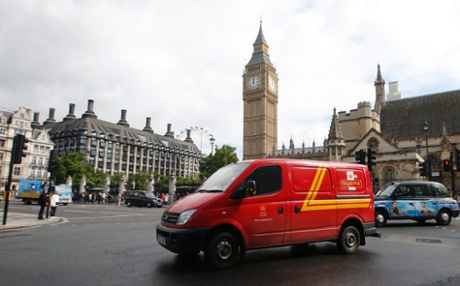 A Royal Mail passes the Houses of Parliament behind it, in central London, September 12, 2013. Photograph: EDDIE KEOGH/Reuters
A Royal Mail passes the Houses of Parliament behind it, in central London, September 12, 2013. Photograph: EDDIE KEOGH/Reuters
Privatisation failed to make firms compete or give customers more choice – said to be the canonical virtues of privatisation. Pretty hard, you would think, to privatise water companies, when they are all monopolies, with nobody to compete with, and can't offer customers a choice – neither the choice of which supplier to use nor the choice of whether to take a service or not. And yet the English water companies were privatised, and in such a way that customers have been overcharged ever since. The privatisers loved competition, but the actual privatised competitors hate it. The competitive vision of those who designed Britain's electricity privatisation – a rumbustious, referee-supervised free-for-all between sellers and makers of electricity old and new, large and small – has degenerated into an opaque oligopoly of a handful of giant players.
The impression grows, on reading Thatcher's autobiography, that she believed the transformational effect of privatisation was such as to turn executives into self-consciously moral, patriotic, civically minded entrepreneurs like her father; as if a monopoly on water supply for several million people were a local grocery shop in a small English town in the 1940s. Privatisation, she claimed, was "the greatest shift of ownership and power away from the state to individuals and their families in any country outside the former communist bloc". The reality is that the faceless state bureaucrats of the old electricity boards have been replaced by the faceless (and better paid) private bureaucrats of the electricity companies. Not only are the privatised utilities big, remote corporations; most of them are no longer British, and no longer owned by small shareholders. Indeed electricity and water privatisation could not have failed more absolutely to foster the emergence of world-beating, innovative British companies. Most of the electricity made and sold in England is now owned by dynamic, tech-savvy companies from western Europe, a region doomed, Thatcher thought, by creeping socialism. As a direct result of the way electricity was privatised, much of it has now been renationalised – but by France, not Britain. Of the nine big English water and sewerage firms, six have achieved the seemingly impossible feat of being privatised a second time, delisted from the stock market by east Asian conglomerates or by private equity consortia. Today much of England's water industry is, it is true, in the hands of individuals and their families, but they don't use English water; they are millions of former civil servants in Canada, Australia and the Netherlands, investing, unwittingly, through their pension funds. The National Health Service is a special case. It hasn't been privatised, and the political parties vie with each other to show that it's safest in their hands. Yet it has been commercialised and repeatedly reorganised, with competition introduced, in such a way as to create a kind of shadowing of an as-yet-unrealised private health insurance system. The story of the transformation of the NHS is part of the wider story of the inheritance of the Thatcher legacy by a Blairite Labour administration over-filled with politicians who struggled to separate their ambitions for Britain from their ambitions for their own and their families' ascent into the six-figure-income class. After their Sisyphean struggles with the Tories and the conservative socialists in their own party, New Labour in power yielded with all too apparent relief to the charms of the business world. It wasn't the creation of foundation trusts for hospitals – or academy schools, or support for housing associations – that was the mistake, rather a lack of awareness that without elaborate safeguards these structures might prove mere waypoints to the next set of privatisations.
 Young children at a Bristol health centre unsure of the benefits of sun-lamps and the special glasses that must be worn, The health centre was part of the newly introduced free National Health Service in 1948 Photograph: Popperfoto/Popperfoto/Getty Images
Young children at a Bristol health centre unsure of the benefits of sun-lamps and the special glasses that must be worn, The health centre was part of the newly introduced free National Health Service in 1948 Photograph: Popperfoto/Popperfoto/Getty Images
What the story of the latter years of the NHS shows is that the most powerful market force eating away at the core of the welfare state is not so much capitalism as consumer capitalism – the convergence of desires between the users of a public service and the private companies providing it when the companies use the skills of marketing to give users a sense of dissatisfaction and peer disadvantage. "If consumption represents the psychological competition for status," writes Daniel Bell, "then one can say that bourgeois society is the institutionalisation of envy." Hip replacement, a procedure invented within the NHS by John Charnley, began as a blessed relief from pain for which patients were, as Charnley said, pathetically grateful. It rapidly progressed to a rationed entitlement. It has now become a competitive market.
This points to a difficulty for anti-marketeers. Since 1945, even if privatisation had never happened, socialism would have struggled with the move from a world of unsatisfied needs to a more complex world of unsatisfied wants.
The selling off of Britain's municipal housing without replacing it was supposed to be a triumphant coming together of the individual and free market principles. It actually ended up as one of the most glaring examples of market failure in postwar history. It wasn't like the other privatisations; its justification as anything other than an electoral bribe to its relatively well-off beneficiaries always rang false. It certainly did to Thatcher in the beginning. She was, she wrote, "wary of alienating the already hard-pressed families who had scrimped to buy a house on one of the new private estates at the market price … They would, I feared, strongly object to council house tenants who had made none of their sacrifices suddenly receiving what was in effect a large capital sum from the Government".
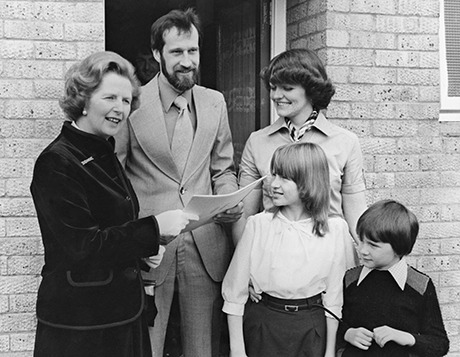 British Prime Minister Margaret Thatcher hands over the deeds to the council house belonging to the King family of Milton Keynes, Buckinghamshire, 25th September 1979. Photograph: Keystone/Getty Images
British Prime Minister Margaret Thatcher hands over the deeds to the council house belonging to the King family of Milton Keynes, Buckinghamshire, 25th September 1979. Photograph: Keystone/Getty Images
In the end, she came round, and made the policy her own. But the gap where the economic rationale for privatising council houses should be becomes a window through which it becomes possible to see beyond the individual privatisations to the meta-privatisation, and its one indisputable success: that it put more money into the hands of a small number of the very wealthiest people, at the expense of the elderly, the sick, the jobless and the working poor.
What do we think we know about taxes since the Thatcher revolution? Government spending has been cut, we know that. Income tax is lower than it used to be, we know that. And we might remember that the one time Thatcher tried to change the principle of progressive taxation, where the amount of tax you pay depends on your income, to a flat fee, where everyone pays the same – when the Conservatives tried to introduce the infamous "poll tax" on council services – it was the catalyst for her downfall. Low tax was her mantra. Her core political message was this, in her own words: "I believe the person who is prepared to work hardest should get the greatest rewards and keep them after tax. That we should back the workers and not the shirkers: that it is not only permissible but praiseworthy to want to benefit your own family by your own efforts."
What we think we know is wrong. Yes, government spending was cut, and it is being cut again, by Thatcher's coalition successors. When the Conservatives came to power in 1979 the top rate of tax was 83%, the basic rate 33. The top rate is now 45% and the basic rate 20%. The message seems clear enough. The Conservatives cut public spending and cut taxes, they kept their promises to working people, and Labour went along with it. But that is not all that happened. At the same time as they cut income tax and public spending, the first Thatcher administration hiked the sales tax, VAT – a flat-rate tax far more remorselessly regressive than the poll tax. When they came to power, the main VAT rate was 8%. It is now 20%. And the poorer you are, the harder VAT hits you. A study by the Office of National Statistics in 2010 showed that, for the richest fifth of the population, VAT added an extra 4 per cent to their tax bill. But the poorest fifth, often thought by the better off to pay no tax at all, actually pay 8.7 per cent of their income to the Treasury in VAT. When the Coalition came to power that year, its first chancellor George Osborne raised VAT by 14 per cent.
Where privatisation comes into this is that VAT isn't the only flat-rate tax on the poor. There are others, and they are onerous; they just aren't called taxes, though they should be – private taxes. One of the other ways the Thatcherites tried to balance the books in their first budgets was by hiking the price of gas, electricity and council rents, then all still under state control. After privatisation, above-inflation price rises have continued, in the private sector. A tax is generally thought of as something that only a government can levy, but this is a semantic distortion that favours the free market belief system. If a payment to an authority, public or private, is compulsory, it's a tax. We can't do without electricity; the electricity bill is an electricity tax. We can't do without water; the water bill is a water tax. Some people can get by without railways, and some can't; they pay the rail tax. Students pay the university tax. The meta-privatisation is the privatisation of the tax system itself; even, it could be said, the privatisation of us, the former citizens of Britain. By packaging British citizens up and selling them, sector by sector, to investors, the government makes it possible to keep traditional taxes low or even cut them. By moving from a system where public services are supported by progressive general taxation to a system where they are supported exclusively by the flat fees people pay to use them, they move from a system where the rich are obliged to help the poor to a system where the less well-off enable services that the rich get for what is, to them, a trifling sum. The commodity that makes water and power cables and airports valuable to an investor, foreign or otherwise, is the people who have no choice but to use them. We have no choice but to pay the price the toll-keepers charge. We are a human revenue stream; we are being made tenants in our own land, defined by the string of private fees we pay to exist here.
It is not racism that makes the foreign identity of some of the owners of our privatised infrastructure objectionable. It's the selling of taxation powers to foreign governments over whom we have even less democratic control than our own. It is the hypocrisy, in particular, of a party that claims to loathe nothing more than communism and totalitarianism obliging Londoners to pay a tithe to the Chinese government just for turning on the tap.
